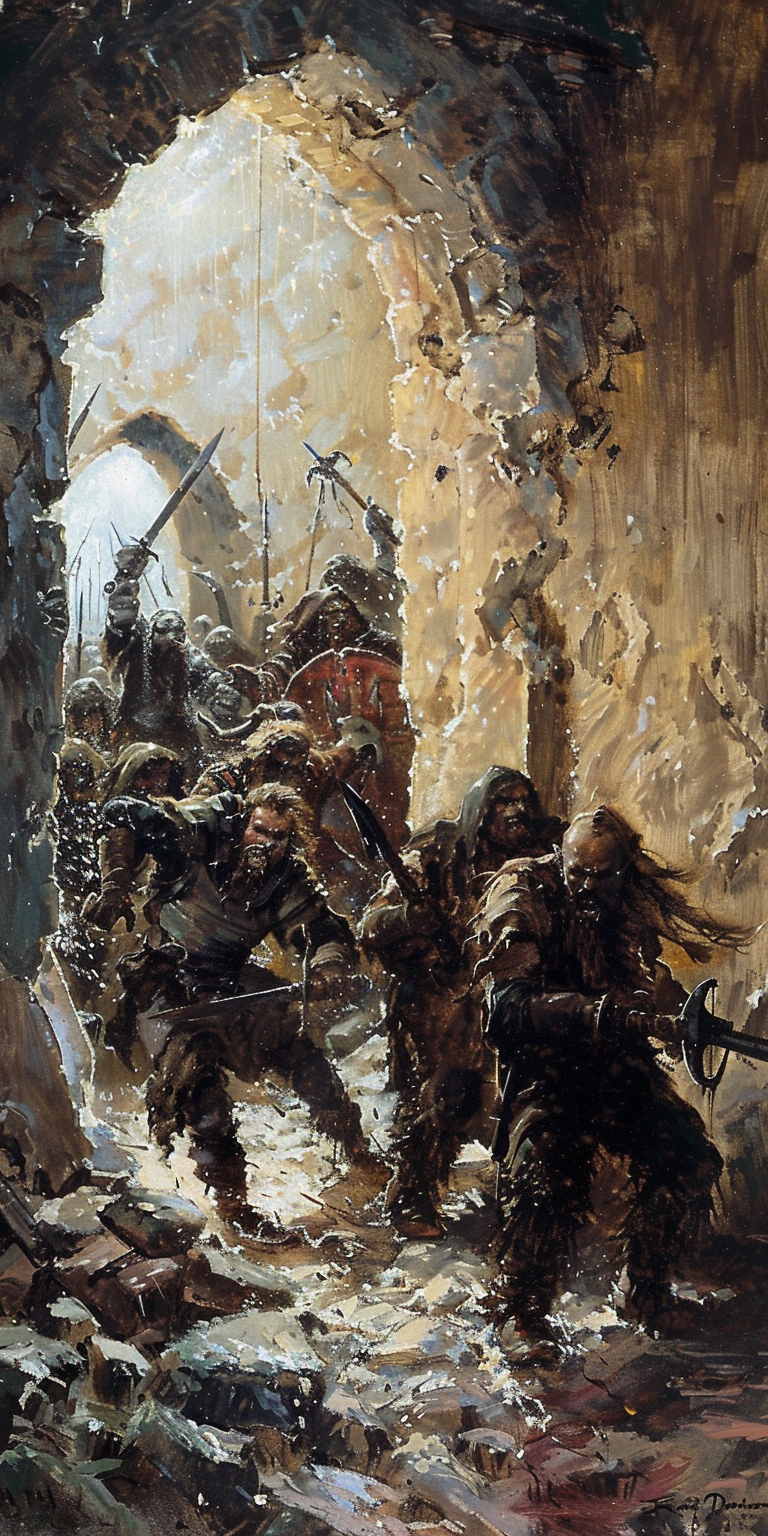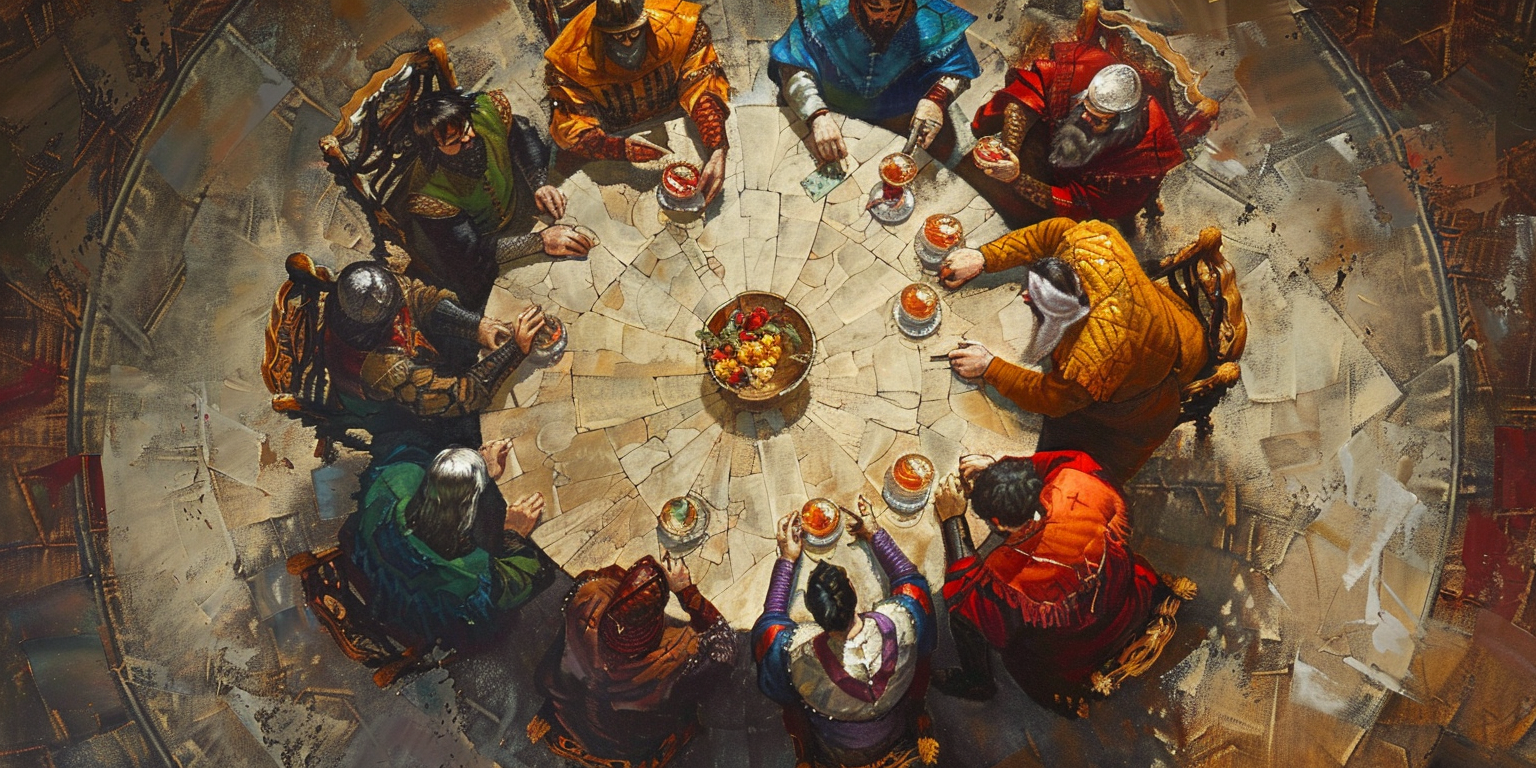Writ of Sale
This writ of sale is to document the passing of Lichtebene and associated territories from the ownership of
Hasdur Martro to the
Hellstrom Governy (ca. Naiber 8, 1952 NG). The transaction will see the transfer of approximately one million acres for 120,000 Elduri Marks. The exchange will be overseen and authenticated by Notary Valen Asmir over the course of twelve installments, each of which will occur in the Governor's Court.
Along with the purchase of land, all titles will be renounced by the seller and assumed by Governor
Gunderr Hellstrom. As per the seller's requests, the land will continue to be utilized for grazing and all feudal obligations in relation to lesser lords will be maintained.
Lesser lords, at the behest of Lord Martro, shall see their loyalty redirected toward Governor Gunderr Hellstrom in perpetuity, and all preceeding conflict shall be halted, lest military action be applied.
The Scramble (ca. 1952 NG) was a political conflict sprung by Lord
Hasdur Martro's sudden abdication of his lands and titles. Martro was in the unique position of being the sole inheritor of his family's land while lacking any descendants to pass it on to in the future. Lichtebene, as one of the largest lordships by grazable land, was desired by every neighboring territory. Purchase estimates were given by the
Gadders,
Hestafulks,
Emilsens,
Rimetusks, and the
Greylend orcs, though no formal purchase could occur without permission from the
Governor, as the change in loyalties for lesser lords could cause financial and political strife.
While the purchase could have been a simple transaction between two greater lords, the government of
Eldurgrund had instated strict land-purchase laws after the
Augury forced the transfer of Elduri land to orc bandits in the
Greylend Pact. With the social strife caused by the
Greylend Pact, such transfers of land were banned out of precedent.
The Greylend Precedent
The purchase of a million acres was concerning of its own volition, though the conflict sprung from contradictions between the purchase itself and established financial regulation. The sale of land over 100,000 acres was prohibited so that social upheaval as seen in the
Greylend Pact wouldn't occur in the future. The details of the Greylend Pact saw a large portion of land taken from
Eldurgrund and given to a growing population of orcs in the area, predominately as a way to limit raids and separate the orcish population. The transaction was forced upon the
governy by their ruling authority: the
Augury. Not only did the land transfer stop the raids, but it also kept
Eldurgrund in check, which was essential given their notorious status as revolutionaries and malcontents.
While the
Augury was pleased with the outcome, the Elduri people grew disdainful of the orcs as thousands of people were forced to relocate across the nation. This disdain, social unrest, and economic disruption led to the ban of such masses of land by the standing
Governor; while the
Augury still held authority over land transfers, the regulation served as a way to maintain the governor's image as an attentive leader. The regulation in question was named the "Greylend Precedent" and was still maintained during the Scramble.
Conflict was initially limited, as
Hasdur Martro asked for express permission to sell his land and title from the governor before opening bids to surrounding lordships. Each bidder was enthusiastic with the governor's hand-wave of prior regulations given that Lichtebene would allow for the expansion of crop developments and sale, especially being so close to the capital,
Euvurcrest. Tensions only rose when the governor himself put a bid on the land; surrounding lords and ladies felt that the bid was rigged, as the only man who could legalize the sale walked away with the land.
The Bidders
The Scramble saw six bidders, mostly greater lords of the surrounding territory. The
Gadders,
Hestafulks,
Emilsens, and
Rimetusks were the first to put a price on the land. Eventually, the orcs of the
Greylends bid as well, though their bid was never seriously considered as it would mean
Eldurgrund would relinquish all authority over the land. The final bid was Governor
Hellstrom, who was only convinced when his wife, Hathor Osman, was able to get the
Osman family to front the gold.
The
Gadder Family hoped to purchase the upper crust of the land, as they desired a stronger land connection to the
Greylends and their people, who made up a large portion of their peasant workforce and allowed for substantial technological exchange. The purchase would also allow a land connection to
Duerinilar, which would ensure technological exchange with the only dwarf lordship. In an ideal scenario, the purchase would allow the Gadders to outmatch any surrounding lordship with regard to innovation (a trait appreciated by the nobles of
Euvurcrest). While the Gadders offered the highest price, the technological potential pushed
Hathor Osman to begin promoting the governor to purchase the land himself to spur more innovation in his own city.
The
Hestafulk Family wished to purchase the southern half of the land which consisted entirely of plains. Given the family's land is titled "
Vastplain," the purchase would help it live up to its full potential. While their price was substantial, the relegation of harvestable land to the Hestafulks meant a potential monopoly on grain and opium. Before the final purchase, the governor declared that the Hestafulks would only be permitted to buy half of their desired territory. Such a declaration meant the Hestafulks were certain they would be able to purchase some portion of the land: a notion that proved wrong when the governy suddenly bought the entirety of the land for themselves.
The
Emilsen Family desired to purchase the land so they could monopolize the trade routes to northern
Eldurgrund, as they already held authority over the major southern bridges. The offer was never considered, as such a trade monopoly would put the
Emilsen Family as the most powerful authority in
Eldurgrund and threaten positive relations with the
Augury (Which Governor Hellstrom had worked tirelessly to improve). The same lack of consideration was given to the
Rimetusk Clan who never disclosed their reason for desiring the land. Governor Hellstrom held several dinners with the clan in an attempt to decrypt their goals, but lack of progress dissuaded him from permitting their purchase.
The final bidder in question was the
Hellstrom Governy, which realized that allowing any lordship to purchase their desired portion of land threatened the nation's balance of power. While the governor's initial plan was to either strictly divide the land or reject the sale, his wife discussed the potential of purchasing it for themselves. Contrary to popular depictions, Gunderr was aware of the strife the purchase would cause but the ability to produce both grain and opium without the need for external lords was enticing to many of his contemporaries. At first consideration, the purchase still seemed frivolous, as the sheer amount of Elduri Marks (Martro refused to be paid in any form aside from physical money) couldn't be justified. Luckily,
Hathor Osman arranged for her family to cover the purchase, which could be paid back over forty years. The contract itself drove concerns within the family as well, as
Gunderr's didn't want to be held accountable for the purchase should they succeed their father.
The Great Hypocrisy
The Scramble involved five large parties before the governy got involved. Such a combination of powers meant clashing was inevitable, and it could be seen early on as different lords attempted to sully the image of other bidders. Ironically, most of the information that led the governor to purchase the land came from each lord outlining the economic problems with selling to other competitors. While each greater lord turned to petty gossip, lesser lords (akin to vassals) within Lichtebene made their opinion of the land transfer clear through crop burnings and property destruction. Having lived under the Martro family for generations, most serfs and lesser lords were belligerent in the face of the sale (especially given most denizens despised Hasdur). While overall conflict between lordships and within Lichtebene was substantial, the impetus of the strife was attributed to "the great hypocrisy."
The great hypocrisy is a colloquial term for the governor's purchase of Lichtebene. Given the Greylend Precedent, the insinuation of selling land to other lords, and the perceived manipulation from the Osmans, it felt as if the purchase was steeped in corruption. Predominately, the disappointed lords felt that Governor Hellstrom would never have legalized the purchase unless it was for himself, setting a dangerous precedent for land purchase in the future. The theorizing was unfounded, yet created a unifying force for the disgruntled lords who would have otherwise focused their hatred toward each other. Due to Governor Hellstrom's unfortunate history of disappointing action, the Scramble served to finalize each lord's opinion of him. To make matters worse, Governor Hellstrom never sent military forces to suppress the lesser lord revolts, feeling it would threaten the loyalty of his future subjects. Ironically, the peaceful lesser and greater lords developed the impression that Gunderr was a cold and uncaring leader for refusing to assist.






Comments